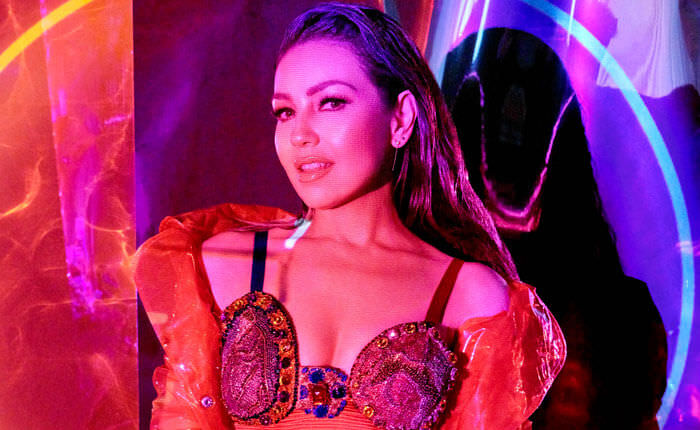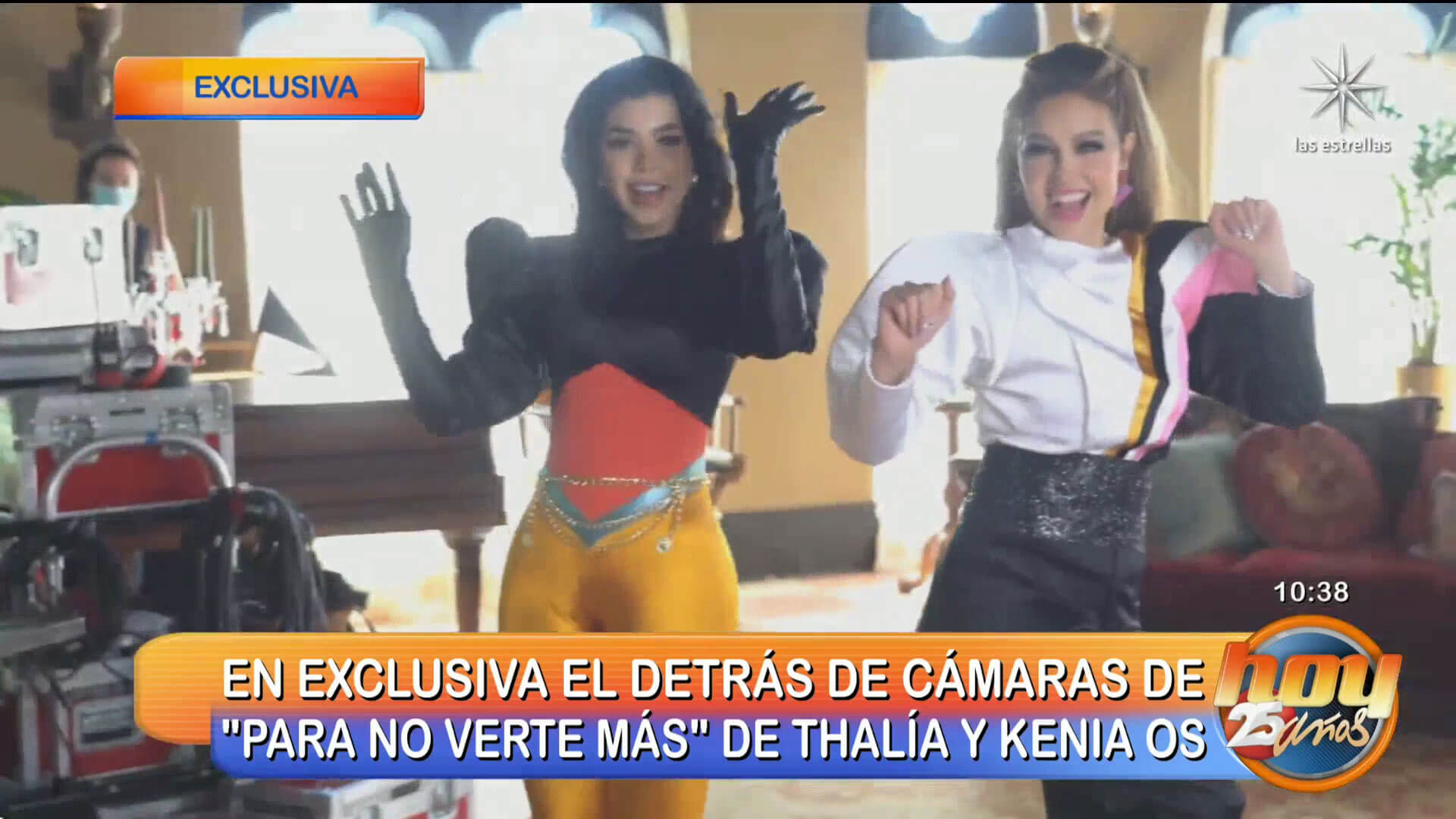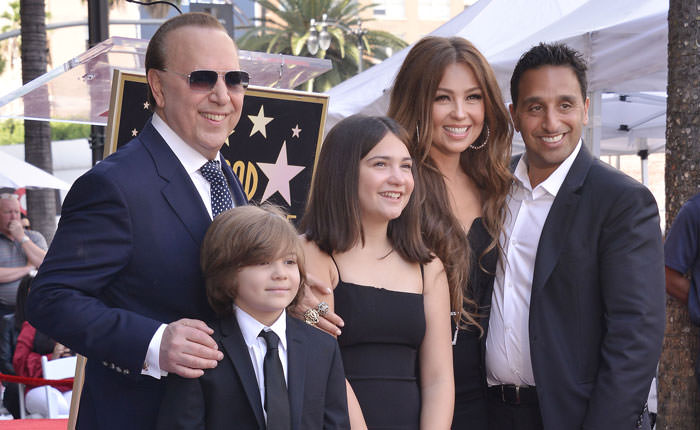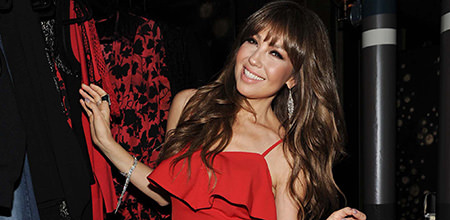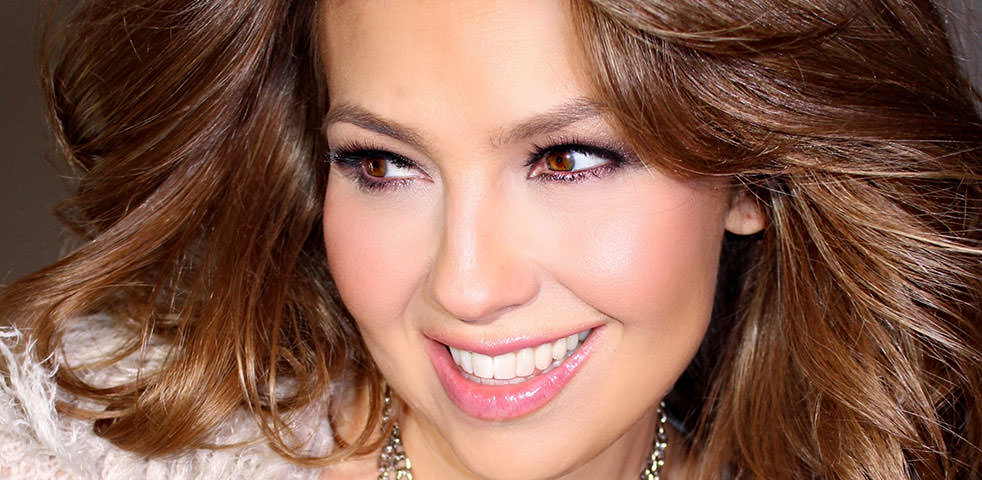The legendary Latin American superstar and fashion icon Thalía candidly talks about how her love life inspired her new album and how the music industry has caught on to the musical curiosity she's had for years.
The history of the mojito cocktail is largely disputed. Though the exact etymology of the word "mojo" is uncertain, its origin traces back to Africa where the word refers to a magical charm or talisman. Add a Spanish suffix for a diminutive and you get "mojito", the sweet yet tart summer drink that some believe was created by African slaves in Cuba. Though originally medicinal, in Latin American icon Thalía's case, it's the magical love enabler.
"When I first saw you, I never thought you'd be suga' for my cocktail", the queen of Latin pop croons in Spanish over a simple guitar strum on her latest single Mojito. The song captures that first contact with passionate love, and treads through the many ways it unfolds, culminating in a mojito-induced kiss. This lust-filled moment marks the starting point for Thalía's voyage through love, heartbreak and metamorphosis on her latest album, desAMORfosis.
"[The album] is opening a dialogue about what has broken you into pieces... what has wounded your heart, what has tattooed your soul, what has slashed your sense of being, and how you've rebuilt yourself to move forward," Thalía says, explaining desAMORfosis theme over a Zoom call, as she sits in front of a perfectly adorned pastel blue and pink colored backdrop. "In that moment, you learned and grew in some way because of those loves." On the album, the singer and mogul thanks past lovers who have taught her something and simultaneously lets them go. "It's an appropriate time to take that internal trip and experience an intense and beautiful metamorphosis in your current life," she explains.
A multi-hyphenated artist, Thalía's legendary career spans musical releases in Spanish, English and even Tagalog. She's acted in telenovelas and created fashion and lifestyle businesses. And while limiting her legacy to a single paragraph doesn't do her justice, she's an institution of Latin pop music, not only in Mexico and Latin America but throughout the entire world—and that speaks volumes. Throughout her 30 plus years in the industry, Thalía has maintained herself at the top of her game by always innovating her craft, whether with sounds or lyrics or fashion. Some of her latest accolades include her 2018 collaboration No Me Acuerdo with Natti Natasha becoming the most listened-to song of that summer in Latin America and receiving the Latin GRAMMYs' President's Merit Award in 2019.
With desAMORfosis, we go on a ride through the Mexican singer's self-reflective exercise, revisiting moments of rejection and loneliness, to the exaltation of a sentimental and sexual attraction, and concluding with development in her character. It encompasses her signature discography, the sonic palette of the record is assorted with catchy pop melodies, heartfelt ballads, and embraces the present: perreo-inducing reggaeton infused bangers. It, of course, wouldn't be a Thalía album without plenty of collaborations. For desAMORfosis, the ¿A Quién Le Importa? singer enlisted el movimiento staples Jhay Cortez, Myke Towers, Farina, and Tainy, as well as her fellow Mexican stars Sofía Reyes and Sergio Lizárraga from Banda MS, among others.
Thalía spoke to GRAMMY.com near the end of last month about desAMORfosis, the stories she's sharing through the album, relying on her intuition to make career moves, and hosting the tribute to women in Latin music by the Latin Recording Academy, Ellas y Su Música.
This interview was conducted in Spanish and has been edited and condensed for clarity.
Congrats on desAMORfosis! How are you feeling about finally releasing the full album after teasing us with a few singles from it?
I'm very eager to share this adventure called desAMORfosis, in which I take mi gente on a very personal journey through 14 songs on what falling in love, falling out of love, and [the process of] metamorphosis have been like in my life.
What are some of your favorite songs on the album?
I love them all. But I can tell you that one is my most treasured, which is the song I close out the album with. It's called Barrio and I love it. This album, the way in which I constructed and formed it, tells the story about what love is to a human being. The way in which it develops, when you meet someone, when you fall in love, when you're blinded by it, when the blindfold falls, when your heart is broken, when you end a relationship but then get back together but it's still not good for you... And at the end you realize that it's actually all about self-love, that you have to start by loving yourself. That's what's important. That song completes the entire circle, it goes back to self-love.
The word "metamorphosis" implies transformation, evolution. Since the album is not only telling stories about the love you experience with someone else, but with yourself too, can you talk about that emotional growth you depict throughout desAMORfosis?
I believe everyone in one way or another, during this pandemic, we've had to take an internal journey no matter what, there wasn't an option. I think all of this made us realize where we wanted to take our lives from now on. I think there's a before and after, and there are things from the past that are a hindrance and you don't have to carry them with you, in your thoughts, your memories. There are things you have to let go off. In the last months, I let go of several heartbreaks, of several loves that, in their time, were important. I embraced, thanked, and let go [of them]. What has stayed with me is that metamorphosis that gives you the strength to stand up, to rebuild yourself, to liberate yourself. It's like healing. And what I've lived through these past months is depicted in each song [on the album].
How does the newest single, Mojito, fit into this narrative arc?
Mojito is that exact moment when you feel a connection with someone. It's the moment when eyes meet, sense of touch follows, then the endorphins, and it goes from there and there's no turning back. This song opens the album and it's something we made in a studio in Miami, Elena Rose, the producers, and I. And when Elenita and I team up, sparks flare and our most sensual sides come out. The result of that is Mojito.
It's interesting that the album opens with that initial connection with someone else, and it concludes with Barrio, which has to do with the sense of belonging.
Exactly. It's about first looking for love outside of yourself and then realizing that what you've traversed throughout your entire life, where you were born, your roots, your family, up til who you are today. That has given you a sense of unique appreciation and that's what shapes your identity.
Speaking of identity, desAMORfosis is a very Thalía album when it comes to genre and sonic diversity. There's some bachata, banda, reggaetón pop. And since the '90s, you've incorporated many Latin sounds in your music, which is now the trend in global music. What's your take on how music has changed and, in a way even, adapted to what you've always been doing?
I feel like everything is cyclical in music, in fashion. All of a sudden, the same behavior patterns repeat themselves but in a new interpretation. In my discography, I've been very curious. My spinal column is pop, but at the same time, I've always liked to interact with other rhythms, with other characters, other singers that will give me different elements. Which now, it's something that people expect from their artists. You expect to hear, on the same song, four artists from different genres, countries, in different languages, and that's OK, it's perfect. But when I first started, that was seen as "that's weird, you can't do that." So it's incredible to see, to realize "híjole [wow], my intuition." And that's what I always tell people, never lose your intuition because that's what makes you different from the rest.
Now that we're on the topic of collaborations, this album also has several of them with newer or emerging artists in the Latin field. Since you're an artist with a longer, more accomplished career, what have you learned working with these artists at the dawn of their careers?
I appreciate those collaborations a lot. Not only with artists, singers and producers, but with everyone, engineers, musicians, anyone who shares some of their knowledge with you. Everyone has their own way of viewing life and that's something I love because when I get out of my comfort zone and I'm in the studio with someone who sees life differently than I do, and uses different words, and structures songs differently than how I do it, it excites me, it provokes [something in] me. It makes me feel like there's still a long way to go.
I'm still obsessed with Tímida, your collaboration with Pabllo Vittar...
It’s so good!
It's so good!!
[sings] Ti tímida, ti tímida. I love it.
It gets stuck in your head all day, in the best way. How do you pick the collaborations you do?
They have to give me a sense of like, they jump out of the screen. In many instances, they'll say, "this person, it'd be great if you collaborate with them," but then I see a video or something on their social media, and I don't connect with them. But there are others where they do something and I say, "that's how we're going to connect and the public will feel it." It's when you feel the, "Yes, we vibe well and the public will vibe with that too."
It resonated with me when you talked about relying on your intuition to make decisions that 15-20 years later have proven fruitful. For example, in the mid-2000's you released your first English album, and the single I Want You even charted on Billboard's Hot 100. Back then, there were many Latinx artists attempting their crossover by singing in English. But now, Latinx artists are charting or even gaining global recognition with their songs in Spanish. What's your take on this, especially since you've been part of the two so-called Latin waves in mainstream music?
I think that now is our moment, and in our language, which is the fascinating part, in comparison to what happened in the '00s, which was us trying to have our crossover in English, but with our Latin sounds. Today, there's respect, love, and recognition for us, for our community, our industry, our music and message. I think that's marvelous, and that it's here to stay for a long time. There's no language anymore, it's just music, it's just rhythm, it's just about feeling it.
You've had a decades-long career where you've always stayed on top, which is not easy, especially for a woman. And, in my opinion, at least, you've always stayed ahead of or adapted well to the times and trends. How do you do this?
I like to listen. I'm stubborn, but I like to listen and learn, too. That's something I learned from my father during the few years I had him with me. But that was it—always ask, always learn, always read, investigate, never settle for the answer given. My father was a criminologist, so he always taught me to learn for myself and that everything is always changing. And I like that. I like to adapt, I like to change, I like to go out of my comfort zone.
Going back a bit to the collaborations, I also loved Tick Tock, with Farina and Sofía Reyes, because not only is it a dope song but the looks you're all wearing are amazing. And the first time I watched it I thought, "Of course, Thalía has always been avant-garde but in a very pop fashion icon way." So in the context of your trajectory and tying it to what you said about everything, especially fashion, being cyclical, how do you choose your looks? What do you want to communicate through them?
Fashion is an extension of a version of yourself from a specific moment. And because we're always changing, we're always evolving. Fashion is a way to express ourselves, and I've used it to create controversy. I've utilized [fashion] to express myself and as an extension of the Thalía from that moment.
Changing topics, there's this reckoning happening right now set off by the Britney Spears documentary on how the media and society as a whole have led toxic, misogynistic narratives about young female stars like her or even Paris Hilton which have impacted their lives and careers. You also started your career as a teen girl, and you experienced a lot of that. Like being criticized for your lyrics or what you wore, or like that time on a TV program where the host said that you looked "corrientota" (cheap, trashy) to your face. I feel like that's something in particular that wouldn't happen today, for example. What are your thoughts on this?
I think that those are instances that aren't permitted by society nowadays. The fact that with a hashtag you can rally communities in an instant and give them a voice and set off a movement [against] an aggression or a disrespectful instance — I think social media is what has made that difference. And I love that because it's an open platform for everyone who has something to say, to fight for, so that they can unite and bring attention [to their cause].
You hosted Ellas y Su Música on May 9, the Latin Recording Academy's tribute to Latinas and women in Latin music. What can you tell us about that?
[It's exciting] because it was about time that we had a program like this, especially backed by the wonderful Latin GRAMMY's. I think it's the right moment to celebrate so many women in the music industry that have paved the way for many others to be able to stand here and to celebrate their achievements. And bravo to the Academy for making this homage and this great program for every woman who has left her mark in the music industry.
Earlier this year you released Thalia: Los Inicios digitally, which included your first few albums. What songs from those records would you tell people to revisit or go discover for the first time?
All of them! Those first three albums are spectacular and they have very profound lyrics, like Flores Secas En La Piel, Sangre. There are many intense songs, the music proposal was very sensual or sexual, like Pacto Entre Los Dos, Love. There are many, many songs, and those are albums that needed that vindication, especially in the digital age. I was very surprised to see them in first place on iTunes, I was like, "This is a dream! If only my mom could've seen this." It’s surreal.
Yes, especially since many of those songs were banned on Mexican radio stations back then.
Those songs were forbidden because of the content! Now you turn on the radio or download a song, the lyrics go above and beyond, but back then it was about going against the grain. And how cool was that? That a 17-year-old girl stuck to her guns and said, "I don't care, I'm going to sing about that!"
And now you can even say "y te encabronaste" (pissed off) on Ya Tú Me Conoces and no one bats an eye.
Exactly, and that's it!
Other than the release of desAMORfosis, what other projects do you have coming out?
We have lots of surprises. Obviously music. We have two other plans that I'm finishing up, and they're spectacular, about to launch. I'm also very excited about the business side, the Thalía Sodi collection, and we have a new collection for the home, things for the bedroom, bathroom, accessories. Many projects, I never stop. I never stay still or quiet. I'm always creating.

